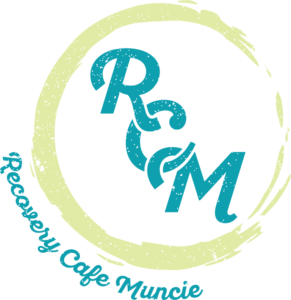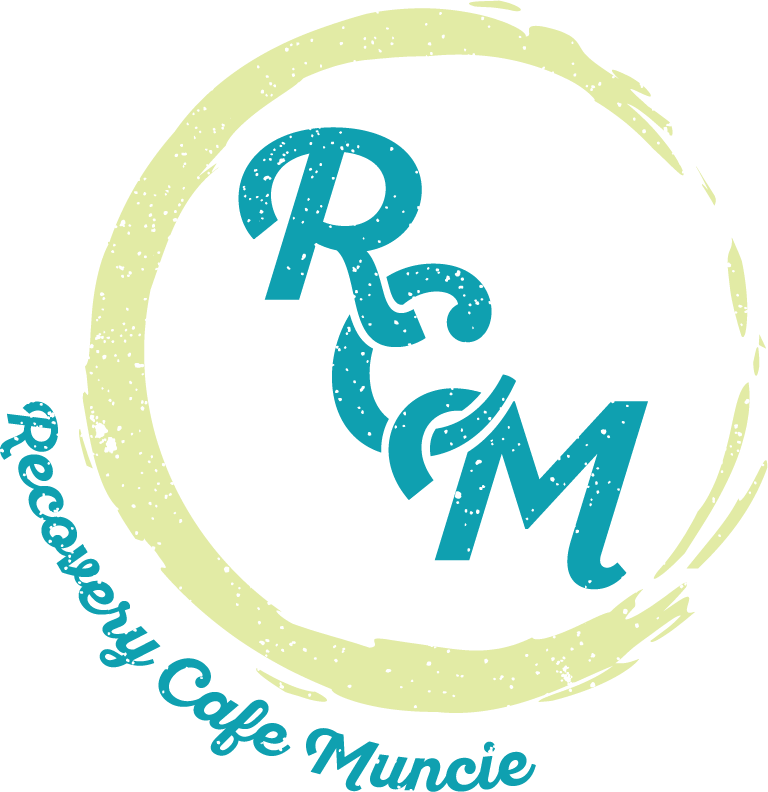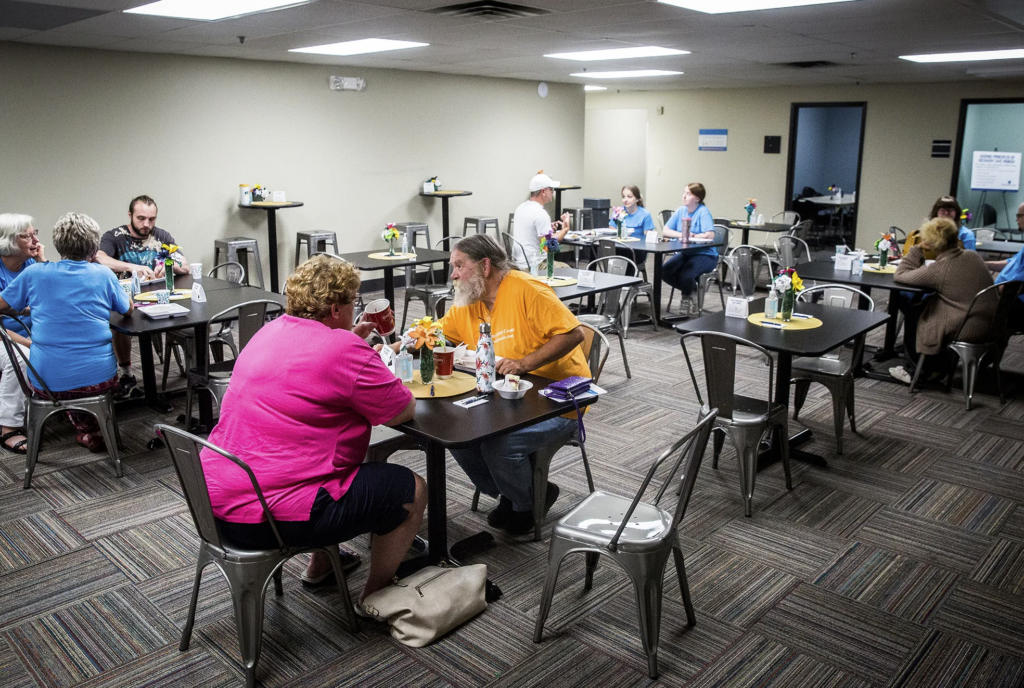For years, Cindy McCormick has struggled with major depression. Not only has it impacted her health, but it’s impacted her ability to work. Living by herself, she’s often felt lonely and has struggled to find ways to connect with others.
That began to change when the 59-year-old heard about the Recovery Café while attending Avondale United Methodist Church this spring.
New to Muncie, the Recovery Café, a national program offering recovery support services outside of the traditional residential in-patient setting, would begin a satellite group at the church.
While McCormick had attended other recovery programs in the past; including A Better Way’s women’s outpatient shelter, Alcoholics Anonymous and church programs, she decided to try Recovery Café, and found it was completely different from any other program.
The newly opened Recovery Cafe on Charles Street in downtown Muncie offers free lunch in addition to peer-led support groups for people facing substance abuse or other issues. Recovery Cafe has multiple locations throughout the state.
Instead of dealing with one type of addiction, those in attendance were in recovery for a variety of reasons, from alcoholism to grief. They didn’t always have to talk about their problems either, and there were plenty of games and other activities.
“I know it’s there, and I feel supported there,” McCormick said. “I can go in there and get different perspectives, from different people. It’s not one specific thing that we’re dealing with.”
Now, Muncie’s own Recovery Café hub, located downtown at 201 E. Charles St., will have a grand opening at 1 p.m. Wednesday, Aug. 18. Here’s what you need to know about the program:
A safe emotional and physical space
The newly opened Recovery Cafe on Charles Street in downtown Muncie offers free lunch in addition to peer-led support groups for people facing substance abuse or other issues. Recovery Cafe has multiple locations throughout the state.
The idea of a Recovery Café coming to Muncie first came about in October 2020 from the Addictions Coalition of Delaware County (ACDC), an academic-community partnership working to bring local addiction recovery resources together under one roof.
Jonel Thaller, an associate professor of social work and co-founder of the coalition, told The Star Press that in smaller towns there aren’t always a variety of services for those struggling with addiction, especially when it comes support services.
“People can’t go to a week or two of treatment, or even a month, and then just be done. Sometimes there’s detox involved, and then intensive inpatient treatment,” Thaller said. “Then when people get out of treatment, they may need sober housing or a place to stay where they’re not around old triggers, and then support services for recovery going forward.”
Thaller, now a board member of Muncie’s Recovery Café, said there needs to be a continuum of care, and when those struggling with addiction exit their inpatient services, it can be hard to find a safe and sober space.
The goal of the Recovery Café is to be that safe emotional and physical space for those in recovery, but participants don’t have to be only those struggling with drug or alcohol addictions.
While many members may be struggling with those types of addictions, there’s also recovery from grief and loss, divorce, codependency, perfectionism, chronic illness or depression. The list goes on, and that’s why the group’s motto is, “Everybody is in recovery for something.”
“We believe everyone has something that’s keeping them from being their best self, or that has the potential to keep them from being their best selves,” Thaller said. “Being in recovery just means that you are intentionally trying to overcome these barriers, with the support of others and the connection.”
A look inside the Recovery Café
The newly opened Recovery Cafe on Charles Street in downtown Muncie offers free lunch in addition to peer-led support groups for people facing substance abuse or other issues. Recovery Cafe has multiple locations throughout the state.
While there are a network of cafés across the county, each has unique, community-based programming. It’s up to the members to make it what they want it to be.
There are staple activities though at the recovery hubs, including recovery group circles, a school for recovery and free meals. Muncie’s downtown Recovery Café hub officially opened its doors in July and currently has hours 11 a.m.-3 p.m., Wednesdays, Fridays and Saturdays in the basement of Commonway Church, 201 E. Charles St., with a free meal served at noon.
Since the hub opened, membership has gone from about a dozen enrolled individuals to more than 40.
The first is that members must be sober for a 24-hour period before attending, in order to maintain a safe and sober space. Members also must commit to attending a weekly recovery circle at the hub or satellite location, such as the Avondale Church. Lastly, they have to give back in some way, which can be as easy as cleaning up after the group meal.
Membership is free and requires just one sign-up sheet asking for basic information. Participants must be at least 18 years old.
The recovery circles are held each week, and it’s always with the same 8-10 group members, Thaller said. During the circles, members can talk about problems they’re facing and achievements in their recovery, but there also are games and other sober activities as well.
“That really helps to build rapport by having the same people in that circle they join each week; it really helps with building connection,” Thaller said.
The circles are blended with different types of recovery, whether from substance abuse or loneliness or something else. There’s also no “graduation” or end to the program; doors are always open to members.
An important aspect of the program is that it’s a peer-led group, often led by those who have been in recovery themselves. This can be crucial in the recovery process, Thaller said, because it creates a more comfortable and supportive environment.
“It’s about having this radical hospitality. There’s not too many other places like that. A lot of people, especially if they’re been struggling for a while, they burn bridges, they don’t feel comfortable going into certain places, or maybe they don’t feel comfortable even going into healthcare settings,” Thaller said. “This is really a more informal social setting, where people are there to positively get to know each other and support each other.”
There’s also the school of recovery, which is open for different types of classes. Currently, the Muncie hub has a yoga and wellness room, but there can be much more.
Beth Kreitl, executive director of We Bloom, an Indianapolis-based organization focused on empowering health in communities, has helped various Recovery Café programs get started. She said the school of recovery is largely based on the interests of members and what they want to participate in.
For many recovery circles, Kreitl has noticed housing seems to be an issue, so they might bring in a guest speaker to talk about affordable housing programs or loans. Restorative justice classes and nutrition also have been big components.
“Trauma recovery is something that we’ve been talking about a lot about (in Muncie), and it’s really the root cause of so many these other recovery challenges,” Kreitl said. “It’s almost like that is the gateway drug. So, so we definitely want to start something here.”
When bringing in guest speakers and different classes, Kreitl said the cafés often look to organizations and individuals in the community to come in. But when choosing which activities to offer, Kreitl said it’s crucial that members have a voice.
“It’s so important that the cafés have their own local identities and be just who they want to be. The goal is that we have these structures that hold them all together; like we’re membership-based, drug- and alcohol-free, we’re totally about love and all pathways are about recovering,” Kreitl said. “But outside of that, make it your own thing. In all honesty, it’ll be hard to know exactly where Muncie goes. It’s kind of like it’s a fresh page.”
Part of a growing network
The newly opened Recovery Cafe on Charles Street in downtown Muncie offers free lunch in addition to peer-led support groups for people facing substance abuse or other issues. Recovery Cafe has multiple locations throughout the state.
While Muncie’s Recovery Café is just getting started, the program was founded in 2003 as a direct response to the unmet need for those who suffer on the margins: that of long-term recovery support.
One year later, the organization opened its doors in Seattle, Wash. In 2016, the program was replicated in San Jose, Calif. and Everett, Wash. By 2020, the Recovery Café Network was supporting more than 20 other communities.
With the help of We Bloom, the state welcomed its first two cafés in Indianapolis and Lafayette in 2019.
Kreitl told The Star Press that We Bloom works as a Midwest regional catalyst with the Recovery Café Network, meaning they help establish cafés within the state. Once they are fully established, the goal is to have a local nonprofit take over in order to focus more on local community needs.
“Our philosophy is, does the community want this? Do they need it?” Kreitl said. And so far, they have.
Shortly after the first two locations opened, both Muncie and Fulton County became interested in opening their own cafés, with the Addictions Coalition of Delaware County leading the charge locally.
Since then, Kreitl said, Fort Wayne, Terre Haute, Greenfield and Marion County have also begun working to establish their own sites.
“So when I tell you the doors are blowing off, with people coming and saying, ‘Can you help us out one of these, what do we need to do?’ It’s kind of blowing my mind,” Kreitl said. “I was talking to the national team yesterday, and I’m like, ‘I don’t know what’s happening in Indiana, but this is just really picking up steam.'”
Along with the national network growing, Kreitl said Muncie’s site was founded in a unique way due to COVID-19. Typically, a Recovery Café hub is opened first, followed by satellite clinics throughout the community when needs arise.
Since local COVID-19 numbers proved too risky to open a large hub last winter, Muncie began with smaller satellite recovery groups, like the one at Avondale Church. Now that Muncie’s hub is opening downtown, Kreitl is hoping the process won’t confuse new comers.
“The whole idea is that those folks go to their weekly circles at that location, but anything and everything else they want to do as a member, they would go to the main site,” Kreitl said.
Satellite locations have proved popular in Muncie though, and Thaller said the program is looking to expand as the hub opens. One has started at the Antioch Church and there is a potential site at Southern Pines, a Muncie Housing Authority neighborhood. However, those who wish to join should start at the downtown hub.
Beyond the grand opening
The newly opened Recovery Cafe on Charles Street in downtown Muncie offers free lunch in addition to peer-led support groups for people facing substance abuse or other issues. Recovery Cafe has multiple locations throughout the state.
With a grand opening slated for Wednesday, Muncie’s Recovery Café is encouraging everyone to check out the program, but organizers know that first step can be hard.
McCormick, who has only missed one group meeting since joining, remembered that feeling, and she said the biggest misconception is that the group is only for those experiencing substance misuse, or that it’s a 12-step-type graduate program.
Coming in to connect with others after battling depression for years, McCormick said recovery can be whatever members want it to be. Through recovery circles, she’s learned to embrace help from others.
“I learned that I need help from other people, because I have kind of gotten away from that,” McCormick said. “I learned that I really can’t do it alone, I need to have help from other people, and it’s easier when you have help from other people.”
Thaller said she understand the hesitancy that comes with joining a recovery group, but she hopes the program can continue breaking barriers to reach more people.
“It seems that people really want to come to one of the meetings or hang out. But there’s just that fear of the unknown; or like, ‘I don’t know who these people are. Can I really trust these people?'” Thaller said. “I hope that we can get a reputation for being a place that is so warm and welcoming that that barrier can be overcome sooner rather than later.”
The group heavily relies on volunteers and donations, and with both of those, the café could have more hours and programming. For those interested in leading recovery circles, Thaller said the group looks for those with experience in being a member of a recovery circle or previous experience with addiction, or those who have a mental health professional background.



